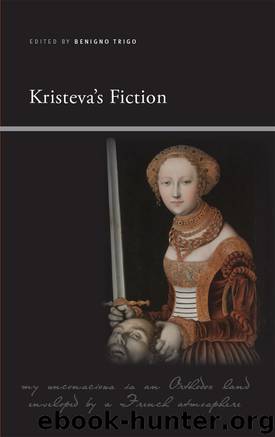Kristeva's Fiction by Philosophy Psychoanalysis Literature)

Author:Philosophy, Psychoanalysis, Literature)
Language: eng
Format: epub
ISBN: 9781438448282
Publisher: State University of New York Press
Published: 2013-09-06T04:00:00+00:00
Notes
1. To Kristeva, the novel genre, in general, is conducive to such revolt insofar as it is fertile ground for exploring “sensory intimacy” as well as for “meditation” (Kristeva 2002a, 5).
2. In her chapter “Fantasy and Cinema” in Intimate Revolt, Kristeva describes fantasy as the “intimate creation of representations” (Kristeva 2002a, 63) that “distortedly admits the subject's desire” (Kristeva 2002a, 65). Boredom in representation works against one's ability to formulate fantasy verbally or pictorially. It allows society's representation to block the creation of imagery of one's own and in turn the bringing to light of one's own desire.
3. It is noteworthy that the chief argument supporting icon veneration during the debates over icons in the eighth century in Byzantium was that “the Incarnation of the Son of God permitted a depiction of Christ as He had been seen on earth”: “The holy Church of God which confesses rightly that there is one hypostasis of Christ in two natures, has been instructed by God to represent Him in icons, in order for her to remember His redemptive dispensation. (Sixth session of the Council of 787)” (Herrin 2007, 111). Iconophiles held sophisticated positions founded on the Incarnation; St. John of Damascus and others thought that Christians could gain a “higher awareness of the divine through the veneration of icons” (Herrin 2007, 114). Kristeva understands the economy of the icon as falling under “neither mimesis nor figure,” emphasizing its (Christ-like) status as “a visible transition between the visible and invisible” (Kristeva 2012, 51). No wonder, more than any other type of icon, the mandylions, “maintained in the popular imagination by the symbolism of the cloth and blood, manifest this transitional economy” (Kristeva 2012, 51).
4. Kristeva's concept of intimate revolt entails a turning back to one's past to question and displace it. By recollecting, interrogating, and thinking, one goes in quest of oneself. Intimate revolt involves an activation of “untenable conflict,” takes place at the “limits of the representable/thinkable/tenable” (Kristeva 2002a, 7), and thus opens psychic life to infinite re-creation. The subject in revolt experiences the erasure of subject/object borders, anamnesis, an interrogation of nothingness, and an assault of the drive for the sake of an eventual psychic restructuring with the goal of rebirth and a renewed link with the other.
Download
This site does not store any files on its server. We only index and link to content provided by other sites. Please contact the content providers to delete copyright contents if any and email us, we'll remove relevant links or contents immediately.
We're Going to Need More Wine by Gabrielle Union(18090)
Bombshells: Glamour Girls of a Lifetime by Sullivan Steve(13122)
Pimp by Iceberg Slim(12953)
The Radium Girls by Kate Moore(10929)
Becoming by Michelle Obama(9305)
The Girl Without a Voice by Casey Watson(7274)
Educated by Tara Westover(7086)
Wiseguy by Nicholas Pileggi(4610)
The Wind in My Hair by Masih Alinejad(4431)
Hitman by Howie Carr(4388)
On the Front Line with the Women Who Fight Back by Stacey Dooley(4319)
Hunger by Roxane Gay(4238)
Year of Yes by Shonda Rhimes(4125)
The Rules Do Not Apply by Ariel Levy(3920)
The Borden Murders by Sarah Miller(3597)
Papillon (English) by Henri Charrière(3283)
Joan of Arc by Mary Gordon(3272)
Patti Smith by Just Kids(3240)
How to be Champion: My Autobiography by Sarah Millican(3198)
